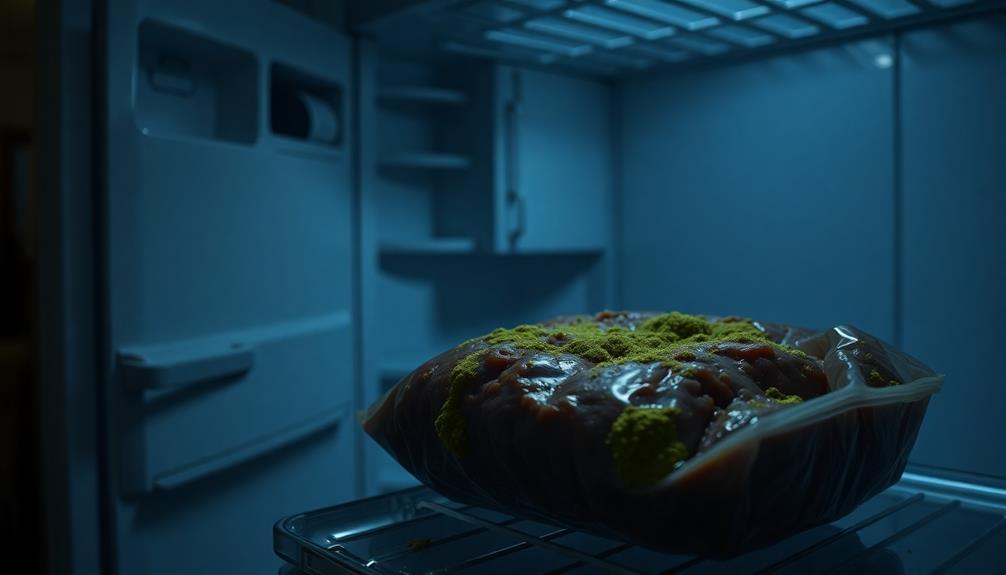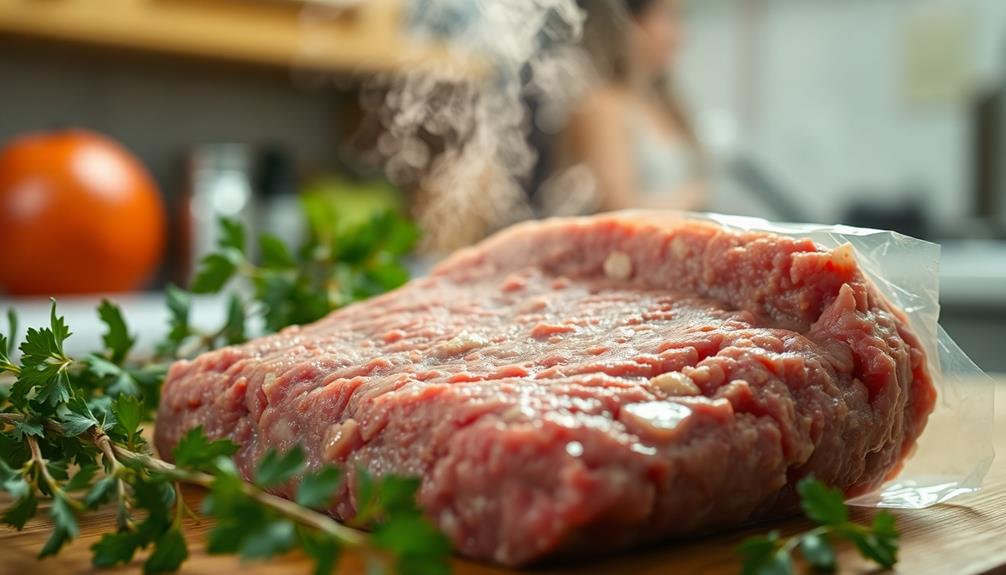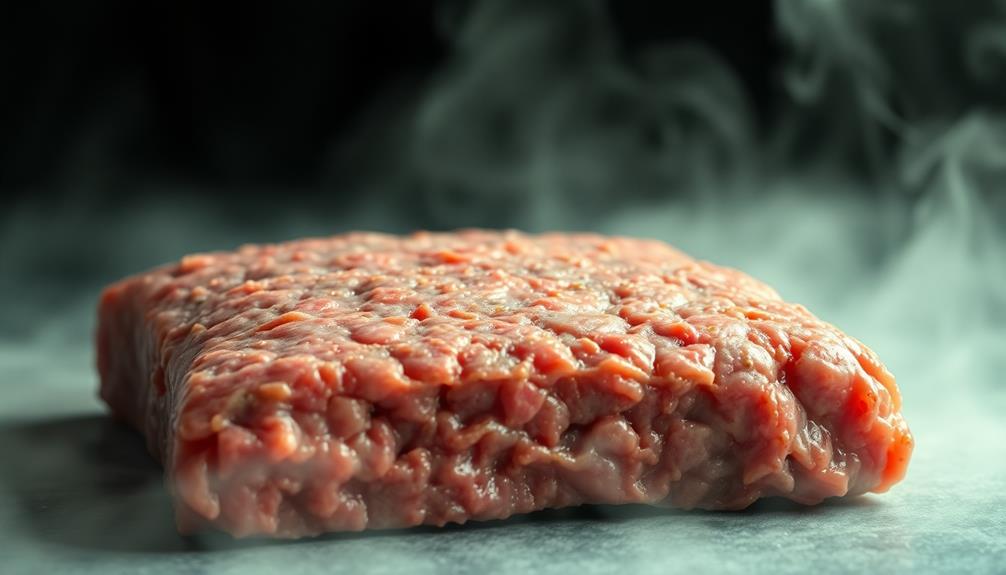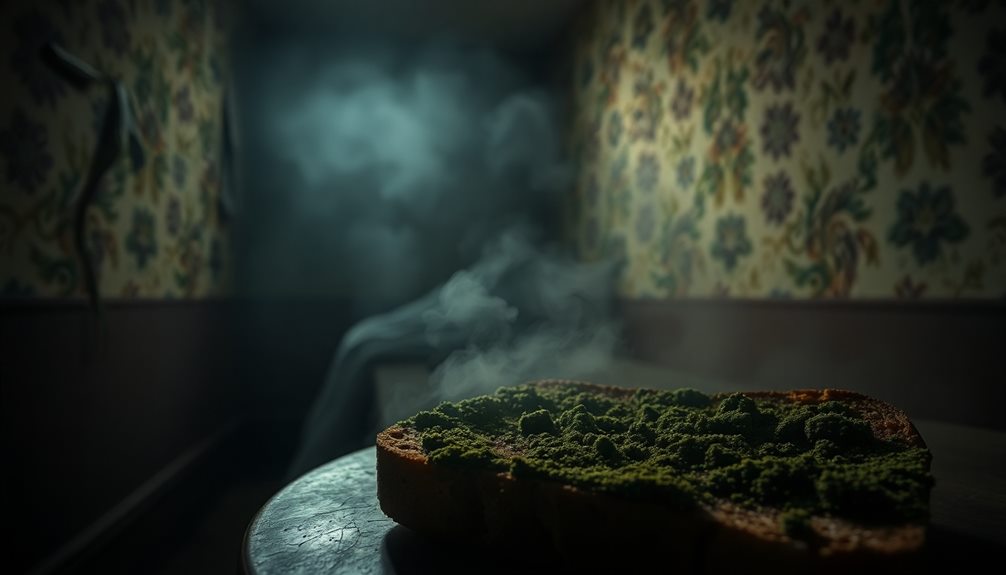If you smell ground beef that gives off a rotten egg scent mixed with ammonia, that's a clear sign it's gone bad! Fresh ground beef should smell neutral with just a hint of iron. Spoiled beef can also have sour or rancid odors that make your nose wrinkle. These off-putting smells happen when bacteria start breaking it down. Always trust your sense of smell; if it smells really bad, it's better to toss it out! Being aware of these clues helps keep you safe and healthy, and there's even more to learn about keeping your meat fresh!
Key Takeaways
- Bad ground beef often emits strong odors reminiscent of ammonia or sulfur, indicating spoilage.
- A rancid smell suggests bacterial growth and that the meat is no longer safe to eat.
- Fresh ground beef should have a neutral smell with a hint of iron, while spoiled beef has foul or putrid scents.
- Tangy or overpowering odors are clear signs of spoilage and warrant immediate disposal of the meat.
- Trusting your sense of smell is crucial, as strong odors can signal potential health risks from consuming spoiled ground beef.
Introduction

When you pick up ground beef at the store, it's essential to know how to identify if it's fresh or spoiled. Fresh ground beef usually has a neutral smell, maybe with a hint of iron. It should never have a strong or off-putting odor.
If you catch a whiff of something sour or rancid, that's bad ground beef! Spoilage bacteria grow and cause that unpleasant smell, which might remind you of ammonia or sulfur.
Trusting your nose is super important! Even if the meat looks fine and feels okay, a foul odor is a clear sign that it's not safe to consume.
If you smell something strong or unpleasant, it's best to toss it in the disposal right away. Remember, it's better to be safe than sorry when it comes to food!
Description of the Smell

A strong, unpleasant odor often characterizes bad ground beef, which can be alarming. When ground beef spoils, it gives off a smell that reminds you of ammonia or sulfur. This is a clear sign that the meat is no longer safe to eat. Instead of the fresh, neutral scent you expect, you might notice a rancid odor as spoilage bacteria take over.
If you detect a distinctly foul or putrid smell, it's best to trust your nose and discard the meat. Fresh ground beef usually has a slight iron scent, but once it's spoiled, the smell changes dramatically. An overpowering or tangy odor means it's time to throw it away to avoid the risk of foodborne illness.
Remember, the smell can be a warning! If something feels off, don't hesitate to toss it in the trash. Keeping your kitchen safe is super important, and recognizing these bad smells can help you stay healthy.
Always aim for fresh meat, and when in doubt, it's better to be safe than sorry. Enjoy your cooking adventures, and keep an eye (and nose) out for any suspicious odors!
Source and Composition

Ground beef's unpleasant smell primarily results from bacterial growth and the breakdown of proteins and fats. When ground beef starts to spoil, it often gives off a strong, unpleasant odor that can remind you of ammonia or sulfur. This odor signals the presence of spoilage bacteria, which thrive and multiply as the meat sits.
Fresh ground beef usually has a mild iron-like scent, but as it nears its expiration date, that smell can become stronger and more sour. If you ever notice rancid notes in the smell, that's a clear sign it's time to say goodbye to the meat.
While pathogenic bacteria, like E. coli and Salmonella, don't produce noticeable odors, you should still look for visual indicators, like discoloration or sliminess. If you've got vacuum-sealed packaging, a mild smell might be normal, but if you open it and the odor hits you like a brick, toss it out immediately!
Always trust your nose, because bad ground beef can make you sick. Keeping an eye (and nose) on your meat helps keep your meals safe and tasty!
Typical Scenarios or Environments

Typically, you'll encounter bad ground beef smell in environments where meat is stored improperly or kept for too long. If you've ever opened your fridge and caught a whiff of a bad odor, it might be spoiled ground beef. As the meat nears its expiration date, it can develop a sour smell that signals bacterial growth.
In airtight packaging, a slight smell might be normal, but if you notice an unpleasant odor when you open it, it's best to toss it out. Fresh ground beef usually has a faint iron scent, but if it starts to smell putrid or foul, that's a clear sign of spoilage.
Sometimes, the smell can change before you see any visible signs of spoilage, so always trust your nose! If it smells tangy or rancid, don't risk it—throw it away!
Emotional or Cultural Associations

The smell of bad ground beef can evoke strong feelings of disgust and wariness, prompting you to steer clear of spoiled food. That unpleasant odor doesn't just signal spoilage; it can also remind you of past experiences with foodborne illnesses. Many people remember getting sick from spoiled meat, making them extra careful about food safety.
In some cultures, sniff tests are a common practice to check for freshness, while others stick to expiration dates. These cultural practices shape how we feel about bad ground beef. When you catch a whiff of that rancid smell, it often triggers emotional associations linked to loss of resources.
Wasting food can feel like a big deal in many societies, and that's why freshness is so important. The strong odor carries a universal negative vibe that reinforces the need to be vigilant.
In your kitchen, this means being mindful and checking your meat before cooking. Remember, the smell is a helpful guide to keep you and your loved ones safe. So, next time you encounter bad ground beef, trust your nose! It's your ally in keeping food fresh and delicious.
Health or Safety Considerations

Often, the smell of bad ground beef serves as a critical warning sign of spoilage and potential health risks. When you notice a strong, unpleasant odor, like ammonia or sulfur, it's time to take action! This bad odor means the beef has likely gone bad and could be unsafe to consume. A rancid or sour smell is a big red flag, signaling that you should discard the meat immediately. Additionally, it’s important to be aware of what bad ground turkey smells like, as it can also pose health risks when spoiled. Ground turkey typically emits a sour or rotten egg-like odor when it has gone bad, which, much like bad ground beef, is a clear indication that it should not be consumed. Always trust your sense of smell as a valuable tool in detecting spoiled meat for both ground beef and ground turkey.
While a faint smell might be okay in vacuum-sealed packages, any strong smell usually means bacteria are at work. Eating spoiled ground beef can lead to foodborne illnesses, which can make you feel really sick. Symptoms like nausea, vomiting, and diarrhea could show up within 1 to 72 hours after eating it, and nobody wants that!
To stay safe, always do a quick smell test. If you catch any unpleasant odor, it's best to err on the side of caution and toss it out.
Final Thoughts

Recognizing the signs of spoilage in ground beef is key to ensuring your safety and health. When you open a package of ground beef, trust your nose! Fresh ground beef should have a neutral scent, maybe even a slight iron smell. If you catch any bad odor, like an unpleasant tangy or putrid whiff, it's time to toss that spoiled beef.
Strong odors that smell like ammonia or sulfur are clear signs of spoilage and can lead to health risks if you eat them. Remember, a faint smell might be okay in airtight packaging, but any off-putting odor means you should definitely not take a chance.
Pathogenic bacteria can be hiding in spoiled ground beef, and you can't always smell them. So, use smell detection along with other signs of spoilage to keep yourself safe.
Staying safe in the kitchen can be fun! By paying attention to how your ground beef smells, you're helping to keep yourself and your family healthy. So next time you cook, remember to sniff it out! Enjoy your cooking adventure, and always prioritize your safety.
Frequently Asked Questions
Is It Normal for Ground Beef to Have a Slight Smell?
Yes, it's normal for ground beef to have a slight smell, often metallic or iron-like due to myoglobin. As it nears expiration, some odor can develop, but it shouldn't be strong or unpleasant.
How Do I Know if My Ground Beef Is Bad?
To know if your ground beef is bad, trust your senses. If it smells sour or tangy, it's spoiled. Check for any discoloration or slimy texture, and when in doubt, just discard it.
Is Beef OK if It Smells a Little?
If your ground beef smells a little, it might still be okay. Trust your instincts; if it's just faint and shows no color or texture changes, you can likely cook and enjoy it safely.
What Does Rotten Beef Smell Like?
When you encounter rotten beef, you'll notice a strong, unpleasant odor, often likened to ammonia or sulfur. If it smells sour or rancid, it's best to discard it immediately to avoid potential health risks.









